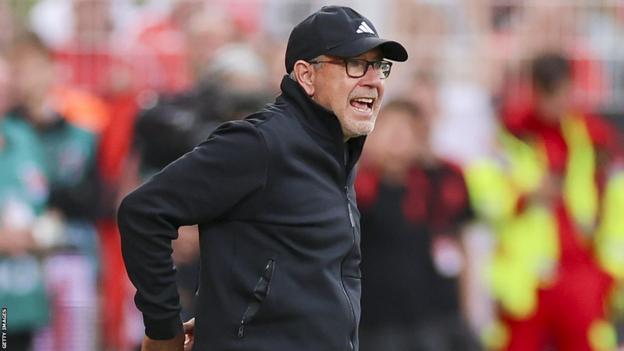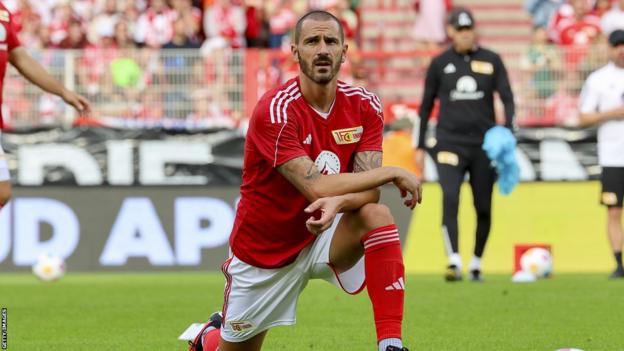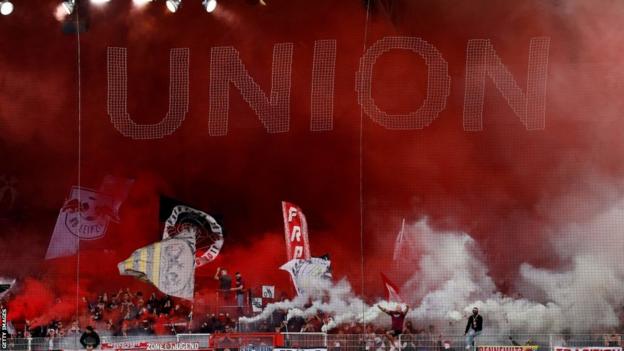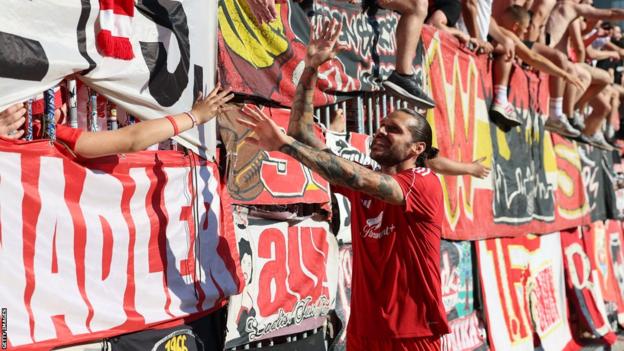“Wahnsinn – it means crazy, mad, incredible. All those things in one word.”
That single German word is how Union Berlin fan Jon Darch describes the past five seasons for his club – and one of the most remarkable rises in European football.
Five years ago Union were playing in the second tier of German football. On Wednesday they will make their Champions League debut against Real Madrid at the Bernabeu.
In consecutive seasons they have gone from 2 Bundesliga to Bundesliga, then into Europe with the Uefa Europa Conference League, then the Europa League and now the Champions League.
They are the first side from Berlin to play in Europe’s elite competition since the traditionally larger Hertha did so in 1999-2000. This season Hertha are in the second tier, looking up at their noisy neighbours.
It is a journey made not with state backing, billionaire owners or – for the most part – household names in the playing squad.
The club are entirely fan owned, financed by more than 40,000 supporter memberships, with those members making key decisions such as the appointment of the chief executive and board.
“Union have shown a third way,” says Mark Wilson, who runs Union In Englisch, a blog and podcast for English-speaking fans.
“Compared to manufactured clubs like Leipzig and factory teams like Wolfsburg, Union have shown a traditional way to success, which is not just about spending money. We are not a cult club – just a club which has entrenched itself in its community.”
A large portion of Union’s success is put down to the combination of Swiss manager Urs Fischer and managing director Oliver Ruhnert, both of whom have been in place since 2018 and have overseen the club’s rise.
Bas Timmers, author of the book ‘Abnormally Ordinary – A Dutchman explains Union Berlin’, says that, amid the club’s reputation for passionate supporters and socialist outlook, their intelligent business is often overlooked.
“Appointing Fischer and Ruhnert was a major turnaround,” he says. “They have made all the difference.
“The squad planning has been meticulous. Ruhnert found a lot of players which Fischer saw the possibility to develop.”

‘Terror football from Kopenick’
“Ruhnert goes out every summer, buys seven players we have never heard of, and Fischer forms them into a team,” adds Darch, a safe-standing campaigner who has been a fan of Union since moving to Berlin 22 years ago.
“Fischer is a miracle worker. And he fits Union so well – he is so down to earth. His native tongue is not high German, but a very Swiss version of German. He has to speak slowly so people can understand him – that helps him come across as very measured.”
On the pitch Timmers describes Union’s counter-attacking style as “terror football from Kopenick”, the district of Berlin in which Union is based.
“Pragmatic, realistic and well executed,” he says. “There are not a lot of clubs in Germany which have been run well in the last 10 years. Bayern and Leipzig maybe, with an attacking playing philosophy to admire. Union has developed their own brand of that – hard to beat football, with maximum effect.”
The rise into the Champions League has not been universally welcomed by fans, particularly given the choice of venue.
Union play their league games at Stadion An der Alten Forsterei, a 22,000-capacity stadium with only 3,000 seats which is renowned for its ferocious atmosphere, and which did not have a roof until 2008 when it was built primarily by volunteer fans.
Despite Uefa rules permitting Union to play at home, the club’s board wanted more fans to be able to attend. So their debut Champions League campaign will take place at the 75,000-capacity Olympiastadion – home of Hertha.
“Commercially the club will do very well,” says Wilson. “You can have 40,000 season-ticket holders at the stadium. Then there will be fascinated neutrals, maybe people who couldn’t get to a game before.”
Union have aimed to stick to the club ethos with pricing – mini season tickets for the three home group stage games are available for 75 euros – and by allocating 1,000 free tickets per Champions League game for needy fans.
But Timmers is still unconvinced. “When we got to the Bundesliga, there were fears the club might change, but no competition or player is bigger than the club.
“I am worried about the Champions League. It has changed our club. It is a big-money league with teams who in our opinion do not belong there – Manchester City, Newcastle, PSG, the marketing club from Leipzig.
“That is not our league, that’s why I have mixed feelings. The Olympic stadium is not home.”

‘A world champion doesn’t necessarily belong here’
Another change to the Union of years gone by can be seen in their summer transfer strategy as they prepare for Champions League football.
Gone are the days of identifying hidden gems who can be turned to profit – such as Taiwo Awoniyi, sold to Nottingham Forest for £20m in 2022.
Arrivals have included Germany wing-back Robin Gosens for a club record fee, as well as midfielder Brenden Aaronson and striker David Datro Fofana, recruited on loan from Leeds and Chelsea respectively.
None is more eye-catching, however, than Leonardo Bonucci. The 36-year-old multiple Serie A champion and Euro 2020-winning captain made Union his first club outside Italy when joining from Juventus this summer.
“Surreal,” says Timmers of Bonucci’s arrival. “A European champion, a world champion, doesn’t necessarily belong here. But he could have gone to Saudi Arabia, and instead goes for something more ambitious – and he brings Champions League experience.
“We have done this before, signing (ex-Borussia Dortmund defender) Neven Subotic when we were promoted. One-year contract, low risk. It is a realistic, pragmatic approach – then we can see where we are in 10 months.”
So is there a risk that Union could lose their precious identity as they garner further success?
“It was always the worry of the fans,” says Wilson, referencing one chant from the year Union were promoted.
“It will sound strange in England – would Brentford or Bournemouth be worried about playing in the Premier League? Union fans were genuinely worried. But the matchday experience has not been diluted.
“Everyone thinks their club is special – it’s that in-built community everyone has. At Union, you get this real sense of community. You know the members, the people involved, it gets to you.”
‘A huge adventure’
Union have been drawn into what looks like one of this season’s toughest Champions League groups alongside Real, Napoli and Braga.
Expectations of what would be a successful European campaign are measured. Wilson would be happy with third place in Group C and dropping into the Europa League. Timmers has different ambitions.
“I’m counting on two to four points for the campaign,” he says. “I expect on the pitch we will not be outplayed at home, but might get some lessons in efficiency – teams like Madrid do not need to have a good day to score out of nowhere.
“Off the pitch, I expect a huge away adventure. I just hope we can maintain the Union culture of togetherness – eating a bratwurst, drinking a beer, supporting our team.”
Darch delves into his German dictionary for another word to sum up Union’s situation.
“Klassenerhalt – class retention. Forget the Champions League – just get 40 points. Staying up is all that counts. Everything else is a bonus.”






